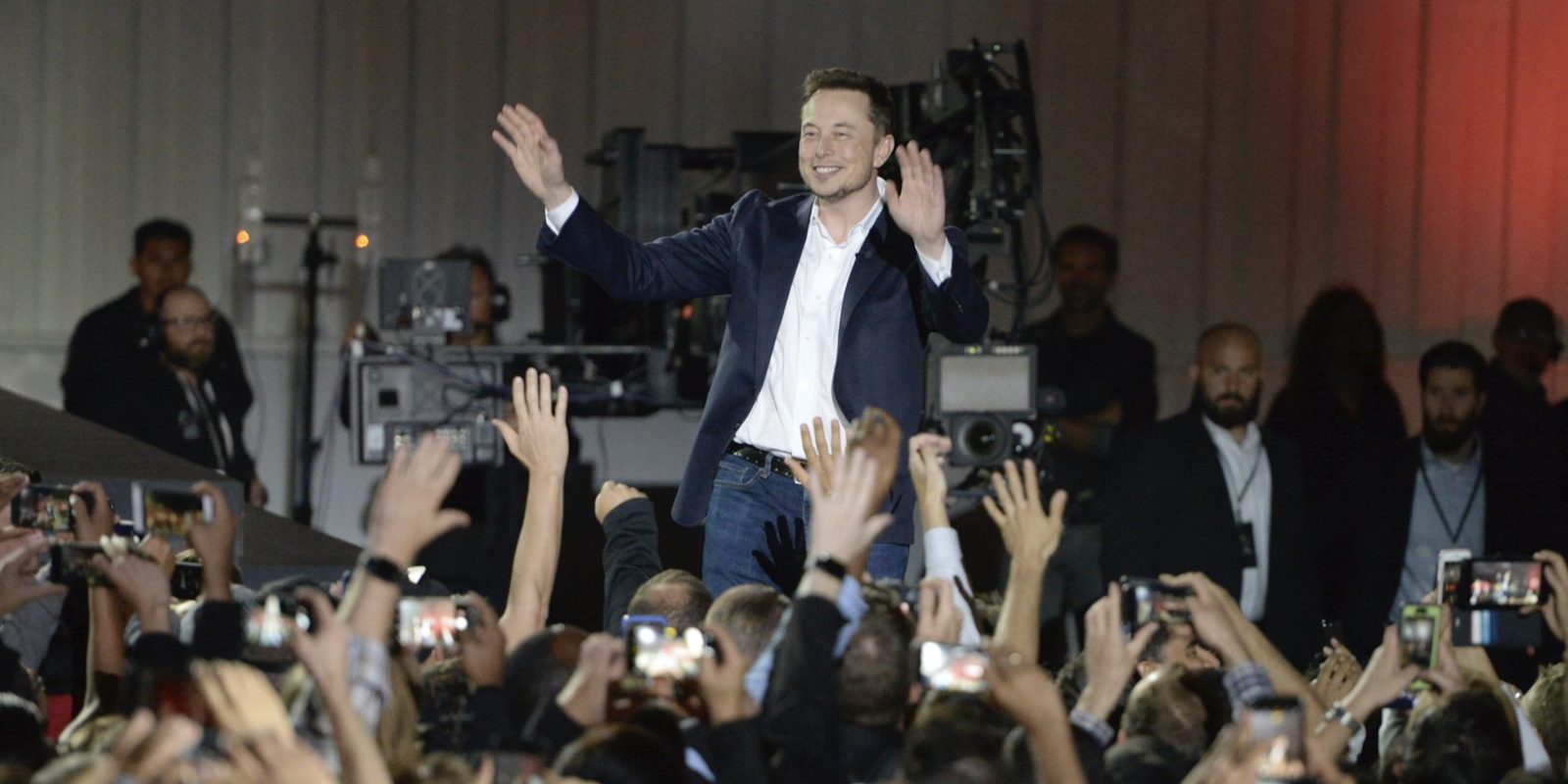
Tesla’s rise in popularity over the last decade created an incredible fanbase that would make Apple jealous. Just as the Cupertino, California, tech company made people fall in love with their phones, Tesla was able seduce their customers to fall in love with their cars.
However, some fringe groups have slipped into super fandom, which is becoming toxic due to slews of attacks against anything that can be perceived as negative toward Tesla.
In my opinion, the attacks and misinformation are not contributing positively to the electric revolution. Here’s why.
Let me preface this by making it clear that I consider myself a fan of Tesla, and it would be hard for anyone to dispute that. I am the happy owner of three Tesla cars (models S, 3, and X) and a satisfied shareholder, but more importantly, I am a believer in Tesla’s mission to accelerate the adoption of electric transport and renewable energy.
Over the last five years, I’ve written over 7,000 articles about electric vehicles. About 6,000 of them were about Tesla, and I’d estimate that about 95% of them offer a positive look at the company.
Now, I am not blind to the fact that I contributed to creating this super fandom around Tesla. I was an early influencer in the Tesla community as Electrek quickly became the biggest electric vehicle publication in the world, with now 10 million monthly readers.
That’s also why I feel the need to speak out on this.
I still stand by those articles, which again are mostly positive, but I can also admit that Tesla is not a perfect company and not beyond criticism. That’s why I also wrote several articles criticizing it, especially when it came to store closures and slashing employee compensation last year.
It led to Elon Musk calling me “anti-Tesla”:
Also, how did you manage to get shamed into being de facto anti-Tesla by social media trolls. Jeez …
— Elon Musk (@elonmusk) April 23, 2019
Obviously, it’s ridiculous for Musk to call someone who is a Tesla investor and who wrote thousands of articles about Tesla’s positive impact on the world “anti-Tesla” simply because he didn’t like a few of my articles during a time when the company was making some very questionable moves. Musk even ended up reversing some of those moves later that year.
Not only did it make no sense, but it was also personally hurtful, since Musk is a hero of mine and I admire a lot of what he has been doing with Tesla, SpaceX, and his other companies.
All that aside, he brings up an interesting point about “social media trolls.” He believes that the Tesla naysayers and shorts who have been attacking me on social media for years have gotten to me, and pushed me to start being negative on Tesla.
Again, that’s not true. I was more negative about Tesla around that time because I disagree with several of its moves related to closing stores and slashing employee compensation — not because of trolls.
But the trolls have indeed created a landscape in the Tesla community that is worth exploring.
There’s no doubt that they exist, and they have been extremely vocal over the years. In order to counter them, some Tesla fans have been appropriately fighting back. However, other Tesla fans have stooped to their level in what I’d consider an inappropriate way.
Personally, I have had plenty of bad experiences with these people. They have sent me insults and even threats at times as they see me as a shill for Tesla. One time, I even received a death threat from an anonymous Tesla short.
It got resolved after an anonymous hacker friend of Electrek revealed the identity of the individual making the threat, and I called the harassing party to express that I don’t take physical threats of violence lightly. He apologized and agreed that it went too far.
Obviously, this is an extreme example. For the most part, they stick to insults, spreading rumors and bad information about Tesla.
But like most things in life, it goes both ways.
There’s a breed of Tesla superfans who believe that the company can do no wrong, and they attack anyone who says anything that can be perceived as negative about the company. They also spread misinformation about Tesla, like the TSLA shorts.
Tesla superfans pushing misinformation
To be clear, the vast majority of Tesla fans are still acting perfectly fine. They just love the products, the mission, and Elon Musk, and love talking about those things in a positive way. There’s nothing wrong with that.
But a fringe group has been giving a bad reputation to the less vocal majority.
One of the best examples is a guy going by “Vincent” on Twitter.
I was first introduced to Vincent in 2018 when he started gaining momentum on Twitter by sharing information about Tesla’s Model 3 launch in China that was being used by other publications.
He shared information and pictures of what he claims was Tesla showcasing Model 3 at different locations in China (the tweet has since been deleted — more information below).
Being generally wary of using information from anonymous people online, I tried to confirm his information. I was skeptical because the showcase was announcing a price, which hadn’t yet been released by Tesla in China, and they were taking reservations with a ~$3,000 deposit.
At the time, I asked Vincent’s help to confirm the information, but he didn’t have many details beyond what he posted on Twitter. I talked to Tesla about it, and the company confirmed that they had nothing to do with those events.
It means that it was a group of people who imported a Model 3 from another country and showcased it around China to defraud people with fake reservations with $3,000 deposits.
I told Vincent about this and suggested that he should take down the information because he was basically promoting fraud, but he wasn’t concerned about it:
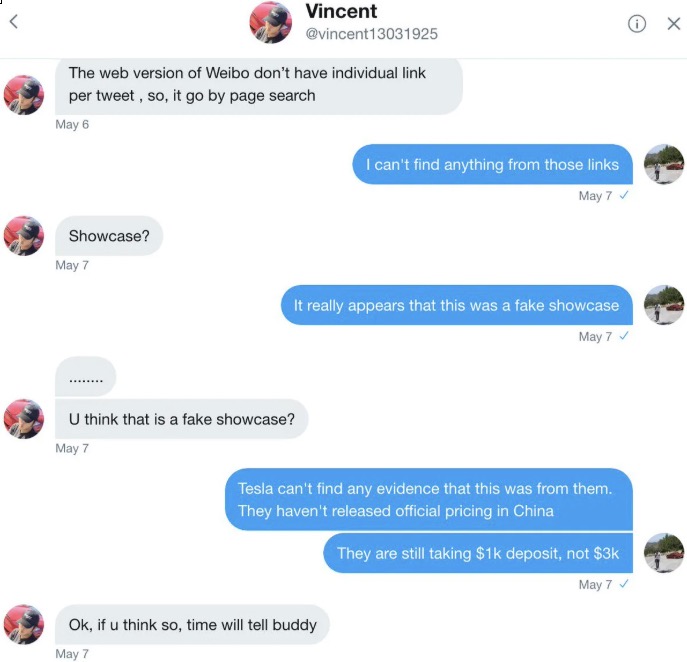
<span style="font-size: revert; color: initial;">He wasn’t a reliable source, so I stopped following him and I thought that would be the end of my interactions with him.</span>
As for him, he kept sharing information and praising Tesla on Twitter — gaining a following of Tesla superfans.
Half a year later, I start getting a flurry of insults on Twitter from Tesla superfans following Vincent. I come to find out that Vincent was falsely accusing me of using information he tweeted without crediting him.
It was easy to prove that it wasn’t the case. Vincent had tweeted pictures and information from a Chinese social media platform without crediting the source.
Someone had previously sent me the actual source via our tip line that I used in a post and credited said source. I shared the proof that he had nothing to do with the information or how I got it, thinking that it would settle the matter and stop the attacks from his tribe of Tesla fans:
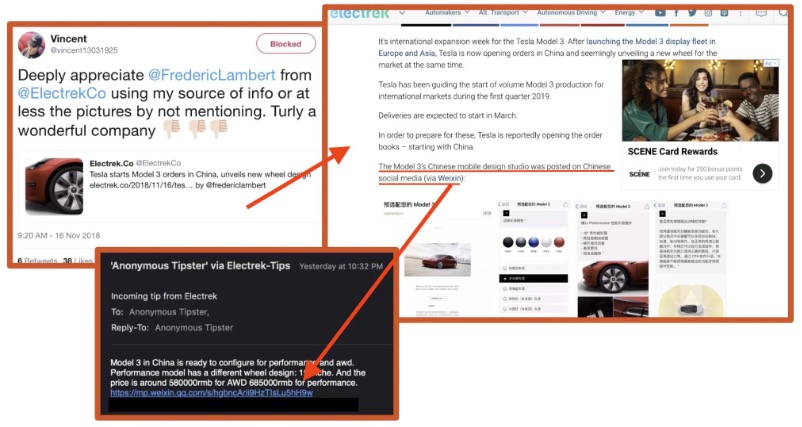
<span style="font-size: revert; color: initial;">Instead of accepting this, his Tesla fan followers stuck to their tribe mentality and doubled down on their attacks, trying to irrationally defend Vincent simply because they saw him as a bigger Tesla fan than me.</span>
Some went as far as reaching out to my publisher and trying to have me fired:
https://twitter.com/sports_univers3/status/1233235686414848000
This is something that is extremely distressing. I found it almost as stressful as the death threat that came from the shorts — though this time it was coming from Tesla fans.
Having your boss ask you why people are calling for a stranger on Twitter to fire you is not something I would wish on anyone. Fortunately, Seth Weintraub, Electrek‘s publisher, was able to easily recognize that these people were just pushing a false narrative.
There’s something very wrong about going after someone’s livelihood, and that’s just one of many attacks from this same gang of Tesla superfans.
After the inexplicable decision of this particular community to back Vincent, I brought up the fact that he promoted fake Tesla showcases in the past, and only then, months later, he deleted the tweet to cover his tracks, but without acknowledging the problem.
Negative for the EV community, for Tesla, and for Elon Musk
Obviously, it’s a bad thing for Tesla and the EV community as a whole if superfans share misinformation, even if it’s positive about Tesla, but there are also many other problems with this Tesla fandom fringe.
These same Tesla superfans are not just attacking me, but many people who dare to constructively criticize Tesla with good reason.
I’ve had several people, who I’d consider Tesla fans, confide in me that they are afraid to share their opinion or their own experience because of the reaction they get from these Tesla superfans who are extremely combative for even the slightest negative comment about the automaker.
This corrupts the feedback loop that has been so useful to Tesla.
It’s something that Elon Musk has often highlighted as one of Tesla’s biggest advantages — maintaining a short feedback loop, which often consists of him responding directly to people on Twitter.
But when Musk only relies on these superfans for the feedback, he is doing himself and Tesla a disservice.
It has never been more apparent than during this coronavirus pandemic.
Musk has been voicing his opinion on the pandemic and the government response to it, and while the broader Tesla community appeared to disagree with him, his opinion was reinforced by this fringe group of cult-like Tesla fans who have been cheering him on.
While the CEO has had some good points about the pandemic, he has been wrong many times too:
Based on current trends, probably close to zero new cases in US too by end of April
— Elon Musk (@elonmusk) March 19, 2020
This tweet didn’t age well since new cases in the US actually reached their highest level at the end of April, and that’s with strong restrictions in place.
Musk also participated in propagating misinformation about the pandemic, including highly criticized information released by two Bakersfield doctors.
The CEO’s criticism ramped up to direct attacks on local health officials and politicians who didn’t support Tesla reopening Fremont factory.
After Musk threatened to move Tesla’s California operations, which employs tens of thousands of people, it unsurprisingly didn’t sit well with many people, including state representative Lorena Gonzalez:
F*ck Elon Musk.
— Lorena Gonzalez (@LorenaSGonzalez) May 10, 2020
While we obviously don’t endorse this type of language, it then led to a good example of a Tesla superfan feeding misinformation to Elon Musk, corrupting his feedback loop. The Tesla superfans quickly went on the offensive and tried to paint her as an oil industry shill.
Update: Below I refer the Third Row Podcast Twitter account as being “run by Vincent and the same previously mentioned group of Tesla superfans”. They wanted me to “correct” saying that Vincent is not running the account and that another podcast member, Sofiaan Fraval, is running the account. However, on the same day and after this article was published, the account claimed to be talking for all members of the podcast including Vincent:
<span style="font-size: revert; color: initial;">Vincent later announced that he left the podcast.</span>
Update #2: Now Omar Qazi, one of the members of the podcast, admitted to being behind the tweets listed below.
Update #3: the entire podcast was disolved and the Twitter account stopped posting following the release of this article
Twitter account “Third Row Tesla Podcast,” which is run by Vincent and the same previously mentioned group of Tesla superfans, posted a series of tweets read by Musk in which they imply that she got paid by the oil industry to push some pro-fossil fuel legislations:
Interesting
— Elon Musk (@elonmusk) May 11, 2020
Tesla’s CEO found their misrepresentation of Gonzalez as an oil shill “interesting,” and he often retweets their congratulatory comments.
They specifically mentioned her delaying a bill about preventing oil drilling next to schools, but Gonzalez used the delay to make amendments and later voted for the bill.
While there’s little to no evidence that she pushed pro-oil legislature, she did receive some money from the oil industry, which The Third Row Podcast made sound like a big deal.
The oil industry donates a lot of money across both aisles, and it actually represents a small fraction of Gonzalez’s funding:
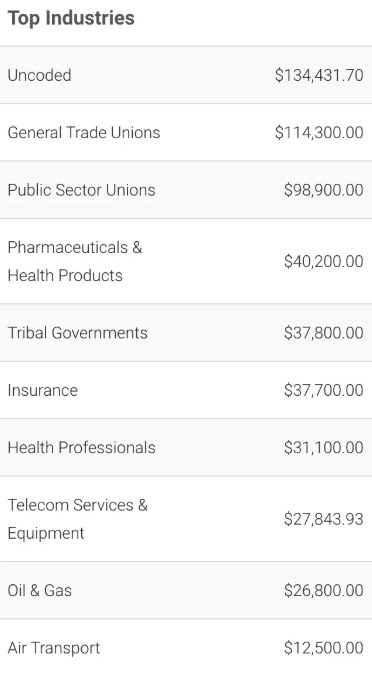
It was really the first time that Gonzalez, who is endorsed by the popular climate group Sierra Club, has been described as an oil industry shill, and it’s obviously erroneous.
Before entering politics, she was a union organizer. Unions are now her biggest campaign contributors, several times bigger than oil and gas, and Musk and Tesla have been known to be anti-union — at least when it came to efforts to unionize Tesla’s operations in California and Germany.
She even followed up her controversial tweet with comments about Tesla’s treatment of workers:
California has highly subsidized a company that has always disregarded worker safety & well-being, has engaged in union busting & bullies public servants. I probably could’ve expressed my frustration in a less aggressive way. Of course, no one would’ve cared if I tweeted that.
— Lorena Gonzalez (@LorenaSGonzalez) May 10, 2020
It’s clear that if her problem with Musk stems from somewhere, it’s from her union roots and the fact that Tesla has been fighting efforts to unionize Fremont factory for a while.
Yet Tesla superfans, who have Musk’s ear, pushed misinformation about her being a shill for the oil industry to explain her problem with Musk.
To be clear, it doesn’t excuse Gonzalez’s comment, but I think this is evidence of Elon Musk’s feedback loop being corrupted by this increasingly cult-like following.
It’s far from the only time that the Tesla superfan behind this Twitter account also pushed misinformation related to Elon Musk.
Earlier this month, I posted an article about how all the requirements for the first tranche of Musk’s stock compensation plan have been fulfilled, and in the opinion section of the article, I introduced the possibility of Musk selling some shares to cover his tax obligations. (Update: Musk indeed started selling Tesla shares due to these stock options being exercised.)
The Third Row Tesla Podcast took offense to that and issued a series of tweets that turned Tesla superfans against me again:
Okay number one the conditions on the options grant were that he can’t sell for five years
Heeeelooooooooo ever heard of researching what you’re writing about
And incentive stock options don’t get taxed I believe
Elon never sells TSLA. He’d rather borrow against it pic.twitter.com/2sVyaY2QHW
— Third Row Tesla Podcast (@thirdrowtesla) May 5, 2020
To be clear, I didn’t even say that Musk would absolutely sell shares. In the past, he has covered his tax obligations by borrowing against his shares, but it has never been with amounts in the hundreds of millions of dollars worth of shares like this specific stock option tranche.
Therefore, I simply introduced the possibility in order to avoid panic if it does happen.
But Third Row Tesla Podcast suggested that it was either an attempt to spread “FUD,” which stands for “fear, uncertainty and doubt,” or I was “genuinely clueless”:
in this case I think he was probably genuinely clueless
— Third Row Tesla Podcast (@thirdrowtesla) May 5, 2020
In fact, they were the clueless ones and spreading misinformation in the process.
At first, they claimed “incentive stock options don’t get taxed,” which is plain wrong.
After it was pointed out to them that it’s not the case, they tried to lie about me by saying that taxes were due when the shares are vested:
It was a complete lie. My take in the article always mentioned that Musk is going to have to pay taxes once he exercises the stock options:
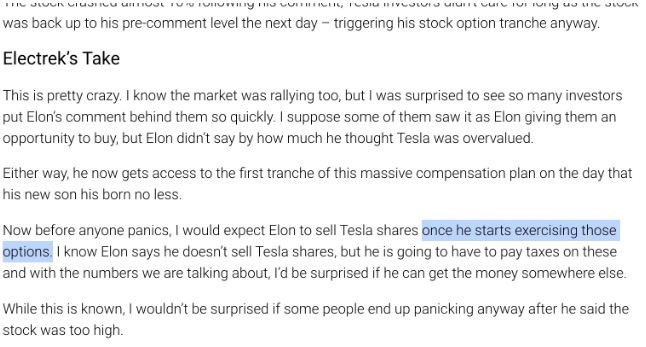
<span style="font-size: revert; color: initial;">In short, Third Row Tesla Podcast shared misinformation about Musk not having to pay taxes on his stock options, and in the process, they called my opinion “dumb” and “clueless” — sending their army of Tesla superfans to insult me.</span>
These are the same people that Musk listens to on Twitter.
A solution?
We need a solution here. I’d hate to see the situation get even worse.
What we have here is a tribal thinking problem where people are loyal to their social group above all else to the point of disregarding the facts. Hopefully it’s not too late.
I am sure that many of these people are too deep into it and will keep attacking people who are criticizing Tesla. And in the most extreme cases, they will keep attacking even people who just say things that could be perceived as negative toward Tesla, even though those people are providing constructive criticism — precisely because they love Tesla.
Despite the fact that I am arguably one of Tesla’s and Elon Musk’s biggest fans, some people will continue to see me as an enemy and ignore all the facts laid out in this article about the misinformation spread by this fringe group of Tesla superfans. It’s easy to sling mud anonymously on Twitter.
But for those who want to improve communication around Tesla and elevate the community, I have a few suggestions.
First off, we should clean up our ways to communicate, and for that, I think Don Miguel Ruiz’s Four Agreements are a good starting point:
- Be impeccable with your word.
- Don’t take anything personally.
- Don’t make assumptions.
- Always do your best.
If we can follow those principles, and by “we” I mean myself, too, I think we are going to be in a much better place to communicate.
I know I am not without blame in this whole thing, because I often break some of those principles, like the second one. It’s hard not to take things personally when you are so invested in something.
For the past five years, I’ve spent 60+ hours per week researching, reading, and writing about electric vehicles.
Number 3 is also really important. I can’t count how many times I’ve seen those superfans accusing people of being short TSLA or trying to spread FUD simply because they said something critical about Tesla.
By assuming those intentions, you are just trying to discredit them and change the conversation. That’s not good.
If people were to only follow this principle, it would already make a giant difference, but while we are at it, let’s follow all of Ruiz’s principles. It can’t hurt.
How about this, Tesla superfans? I promise to be better at following those principles, and you do the same. Tesla and the entire EV community are going to be better for it.
And Elon, if you are listening, I’d encourage you to do the same. No hard feelings.
FTC: We use income earning auto affiliate links. More.
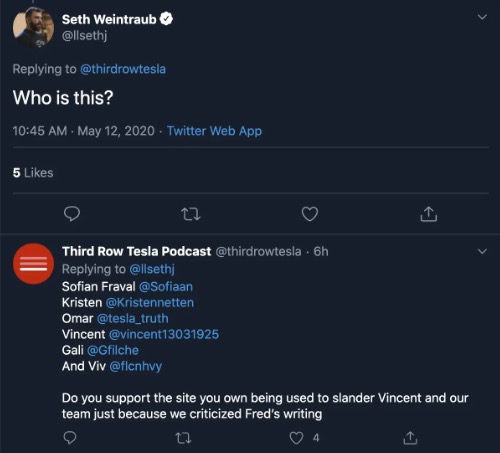






Comments